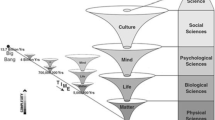Abstract
Traditional accounts of the Individual Psychology of Alfred Adler tend to sentimentalize his system and obscure its functional flavor. Six basic Adlerian positions on human behavior, including Rudolf Dreikurs’ “four goals of misbehavior,” are interpreted as a primitive statement of operant principles. Applied techniques long used by Individual Psychology practitioners strongly resemble interventions that applied behavior analysts have developed by more systematic means.
Similar content being viewed by others
References
Adler, A. (1931). The case of Mrs. A: The diagnosis of a life style. Chicago: Alfred Adler Institute of Chicago.
Adler, A. (1956). The Individual Psychology of Alfred Adler (H. L. Ansbacher & R. R. Ansbacher, Eds., Trans.). New York: Harper & Row.
Ansbacher, H. L. (1982). Robert S. Woodworth, Schafer’s action language, and Alfred Adler. Contemporary Psychoanalysis, 18, 112–118.
Ansbacher, R. R. (1975). Behavior therapy made humanistic [Review of Clinical behavior therapy]. Journal of Individual Psychology, 31, 107–108.
Ansbacher, H. L., & Ansbacher, R. R. (1956). See Adler, A. (1956).
Bijou, S. W. (1976). Child development: The basic stage of early childhood. Englewood Cliffs, NJ: Prentice-Hall.
Blackham, G. J., & Silberman, A. (1975). Modification of child and adolescent behavior (2nd ed.). Belmont, CA: Wadsworth.
Cossairt, A., Hall, R. V., & Hopkins, B. L. (1973). The effects of experimenter’s instructions, feedback, and praise on teacher praise and student attending behavior. Journal of Applied Behavior Analysis, 6, 89–100.
Day, W. F. (1969). Radical behaviorism in reconciliation with phenomenology. Journal of the Experimental Analysis of Behavior, 12, 315–328.
Day, W. F. (1975). Contemporary behaviorism and the concept of intention. In W. J. Arnold (Ed.), Nebraska Symposium on Motivation, Vol. 23 (pp. 65–131). Lincoln, NE: University of Nebraska Press.
Dinkmeyer, D., & Dreikurs, R. (1963). Encouraging children to learn. New York: Hawthorn Books.
Dreikurs, R. (1947). The four goals of the maladjusted child. Nervous Child, 6, 321–328.
Dreikurs, R. (1948). The challenge of parenthood. New York: Duell, Sloan and Pearce.
Dreikurs, R. (1967). Adult-child relations. Chicago: Alfred Adler Institute of Chicago.
Dreikurs, R. (1972). Toward a technology of human relationship. Journal of Individual Psychology, 28, 127–136.
Dreikurs, R., & Grey, L. (1968). A new approach to discipline: Logical consequences. New York: E. P. Dutton.
Dreikurs, R., Grunwald, B., & Pepper, F. (1971). Maintaining sanity in the classroom. New York: Harper & Row.
Dreikurs, R., & Soltz, V. (1964). Children: The challenge. New York: Hawthorn Books.
Givner, A., & Graubard, P. S. (1974). A handbook of behavior modification for the classroom. New York: Holt, Rinehart and Winston.
Grunwald, B. (1964). Minutes of a school class council. Oregon Society for Individual Psychology Newsletter, 5 (2).
Hall, C. S., & Lindzey, G. (1970). Theories of personality (2nd ed.). New York: John Wiley & Sons.
Harzem, P., & Williams, R. A. (1983). On searching for a science of human behavior. Psychological Record, 33, 565–574.
Lidrich, P. (1968). Class council for first grade. Individual Psychology Newsletter, 18 (9–10, Whole No. 206–207), 77.
Litow, L., & Pumroy, D. K. (1975). A brief review of classroom group-oriented contingencies. Journal of Applied Behavior Analysis, 8, 341–347.
Lovitt, T. C., & Curtis, K. A. (1969). Academic response rate as a function of teacher- and self-imposed contingencies. Journal of Applied Behavior Analysis, 2, 49–54.
Madsen, C. H., Jr., & Madsen, C. K. (1974). Teaching/discipline (2nd ed.). Boston: Allyn and Bacon.
Meacham, M. L., & Wiesen, A. E. (1974). Changing classroom behavior (2nd ed.). New York: Intext Educational Publishers.
Nye, R. D. (1979). What is B. F Skinner really saying? Englewood Cliffs, NJ: Prentice-Hall.
O’Connell, W. E. (1975). Action therapy and Adlerian theory. Chicago: Alfred Adler Institute of Chicago.
Page, T. J., Iwata, B. A., & Reid, D. H. (1982). Pyramidal training: A large-scale application with instructional staff. Journal of Applied Behavior Analysis, 15, 335–351.
Parrott, L. J. (1983). Defining social behavior: An exercise in scientific system building. Psychological Record, 33, 533–550.
Poffenberger, T. (1953). The Family Council: Kids can confer. Oregon State College Extension Bulletin 739. Corvallis, OR: Oregon State College.
Pratt, A. (1984). How is “private logic” acquired? Skinner’s psychology of private events. Manuscript submitted for publication.
Schultz, D. (1981). A history of modern psychology (3rd ed.). New York: Academic Press.
Skinner, B. F. (1953). Science and human behavior. New York: Macmillan.
Skinner, B. F. (1968). The technology of teaching. New York: Appleton-Century-Crofts.
Skinner, B. F. (1971). Beyond freedom and dignity. New York: Alfred A. Knopf.
Skinner, B. F. (1974). About behaviorism. New York: Alfred A. Knopf.
Sulzer-Azaroff, B., & Mayer, G. F. (1977). Applying behavior-analysis procedures with children and youth. New York: Holt, Rinehart and Winston.
Vargas, J. S. (1977). Behavioral psychology for teachers. New York: Harper & Row.
Vernon, W. M. (1972). Motivating children. New York: Holt, Rinehart and Winston.
Watson, R. I. (1978). The great psychologists (4th ed.). Philadelphia: J. P. Lippincott.
Author information
Authors and Affiliations
Additional information
This article is a revised version of a paper read at the meeting of the Association for Behavior Analysis, May 28, 1983, in Milwaukee.
Rights and permissions
About this article
Cite this article
Pratt, A.B. Adlerian Psychology as an Intuitive Operant System. BEHAV ANALYST 8, 39–51 (1985). https://doi.org/10.1007/BF03391911
Published:
Issue Date:
DOI: https://doi.org/10.1007/BF03391911



